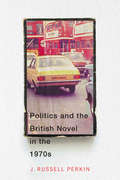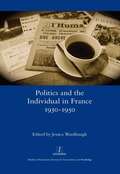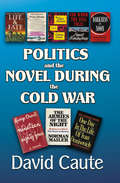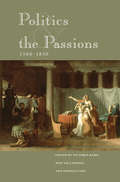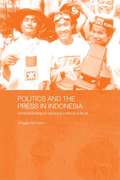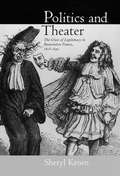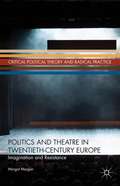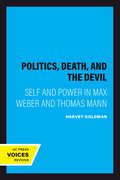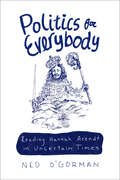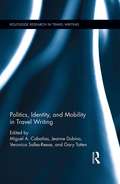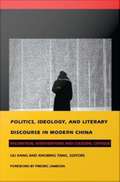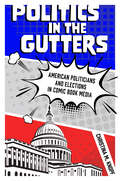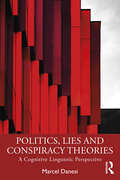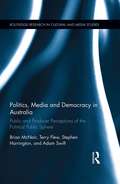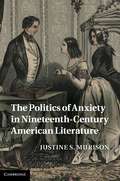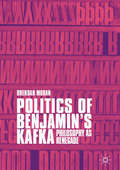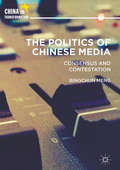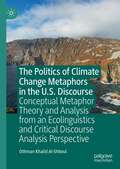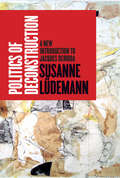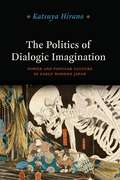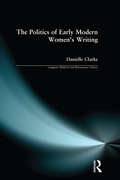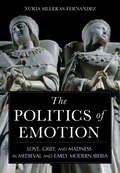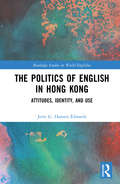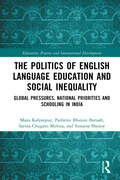- Table View
- List View
Politics and the British Novel in the 1970s
by J. Russell PerkinThe 1970s in Britain saw a series of industrial disputes, a referendum on membership in the European Economic Community, conflict about issues of immigration and citizenship, and emergent environmental and feminist movements. It was also a decade of innovation in the novel, and novelists often addressed the state of the nation directly in their works.In Politics and the British Novel in the 1970s Russell Perkin looks at social novels by John Fowles and Margaret Drabble, the Cold War thrillers of John le Carré, Richard Adams's best-selling fable Watership Down, the popular campus novels of Malcolm Bradbury and David Lodge, Doris Lessing's dystopian visions, and V.S. Naipaul's explorations of post-colonial displacement. Many of these highly regarded works sold in large numbers and have enjoyed enduring success – a testament to the power of the political novel to explain a nation to itself. Perkin explores the connections between the novel and politics, situating the works it discusses in the rich context of the history and culture of the decade, from party politics to popular television shows.Politics and the British Novel in the 1970s elucidates a period of literary history now fifty years in the past and offers a balanced perspective on the age, revealing that these works not only represented the politics of the time but played a meaningful role in them.
Politics and the Individual in France 1930-1950
by Jessica WardhaughThe crises and conflicts of mid-century Europe highlight the fragility of individual life and commitment. Yet this was a time at which individuals engaged in politics on an unprecedented scale, whether in movements, parties and street politics, through culture, or by the choices confronted in war and occupation. Focusing on France, and bringing together historians of politics, literature, philosophy, art, and film, this volume sheds new light on the imagination and experience of the political individual in the age of the masses. From a controversial art exhibition on Algeria to the private diary of a Jewish lawyer in Occupied Paris, these case studies illuminate the specificities of French ideas and experiences in mid-century Europe. They also contribute to a deeper understanding of memory, agency, and responsibility in times of crisis.
Politics and the Novel During the Cold War
by David CauteDavid Cautes wide-ranging study examines how outstanding novelists of the Cold War era conveyed the major issues of contemporary politics and history. In the United States and Western Europe the political novel flourished in the 1930s and 1940s, the crisis years of economic depression, fascism, the Spanish Civil War,the consolidation of Stalinism, and the Second World War. Starting with the high hopes generated by the Spanish Civil War, Caute then explores the god that failed pessimism that overtook the Western political novel in the 1940s. The writers under scrutiny include Hemingway, Dos Passos, Orwell, Koestler, Malraux, Serge, Greene, de Beauvoir, and Sartre. Strikingly different approaches to the burning issues of the time are found among orthodox Soviet novelists such as Sholokhov, Fadeyev, Kochetov, and Pavlenko. Soviet official culture continued to choke on modernism, formalism, satire, and allegory. In Russia and Eastern Europe dissident novelists offered contesting voices as they engaged in the fraught re-telling of life under Stalinism. The emergence of the New Left in the 1960s generated a new wave of fiction challenging Americas global stance. Mailer, Doctorow, and Coover brought fresh literary sensibilities tobear on such iconic events as the 1967 siege of the Pentagon and the execution of the Rosenbergs.
Politics and the Passions, 1500-1850
by Victoria Kahn ; Neil Saccamano & Daniela ColiFocusing on the new theories of human motivation that emerged during the transition from feudalism to the modern period, this is the first book of new essays on the relationship between politics and the passions from Machiavelli to Bentham. Contributors address the crisis of moral and philosophical discourse in the early modern period; the necessity of inventing a new way of describing the relation between reflection and action, and private and public selves; the disciplinary regulation of the body; and the ideological constitution of identity. The collection as a whole asks whether a discourse of the passions might provide a critical perspective on the politics of subjectivity. Whatever their specific approach to the question of ideology, all the essays reconsider the legacy of the passions in modern political theory and the importance of the history of politics and the passions for modern political debates. Contributors, in addition to the editors, are Nancy Armstrong, Judith Butler, Riccardo Caporali, Howard Caygill, Patrick Coleman, Frances Ferguson, John Guillory, Timothy Hampton, John P. McCormick, and Leonard Tennenhouse.
Politics and the Press in Indonesia: Understanding an Evolving Political Culture
by Angela RomanoThis book explores the evolving political culture in Indonesia, by discussing the country's dominant political philosophies, then showing how those philosophies affect the working lives of ordinary Indonesian citizens. It focuses in particular on the working lives of news journalists, a group that occupies a strategic social and political position.
Politics and Theater: The Crisis of Legitimacy in Restoration France, 1815-1830
by Sheryl KroenIn this book, Sheryl Kroen views post-revolutionary France in the years of the Restoration. Following the lead of the French men and women who turned to this play in the 1820s to make sense of their world, Kroen exposes the crisis of legitimacy defining the regime in these years and demonstrates how the people of the time made steps toward a democratic resolution to this crisis.
Politics And Theatre In Twentieth-century Europe
by Margot MorganThis book explores the connection between politics and theatre by looking at the works and lives of Shaw, Brecht, Sartre, and Ionesco, providing a cultural history detailing the changing role of political theatre in twentieth-century Europe.
Politics, Death, and the Devil: Self and Power in Max Weber and Thomas Mann
by Harvey GoldmanThis sequel to Harvey Goldman's well-received Max Weber and Thomas Mann continues his rich exploration of the political and cultural critiques embodied in the more mature writings of these two authors. Combining social and political thought, intellectual history, and literary interpretation, Goldman examines in particular Weber's "Science as a Vocation" and "Politics as a Vocation" and Mann's The Magic Mountain and Doctor Faustus.Goldman deals with the ways in which Weber and Mann sought an antidote to personal and cultural weakness through "practices" for generating strength, mastery, and power, drawing primarily on ascetic traditions at a time when the vitality of other German traditions was disappearing. Power and mastery concerned both Weber and Mann, especially as they tried to resolve problems of politics and culture in Germany. Although their resolutions of the problems they confronted seem inadequate, they show the significance of linking social and political thought to conceptions of self and active worldly practices.Trenchant and illuminating, Goldman's book is essential reading for anyone interested in political theory, social thought, and the intellectual history of Germany.
Politics for Everybody: Reading Hannah Arendt in Uncertain Times
by Ned O'GormanIn this age of nearly unprecedented partisan rancor, you’d be forgiven for thinking we could all do with a smaller daily dose of politics. In his provocative and sharp book, however, Ned O’Gorman argues just the opposite: Politics for Everybody contends that what we really need to do is engage more deeply with politics, rather than chuck the whole thing out the window. In calling for a purer, more humanistic relationship with politics—one that does justice to the virtues of open, honest exchange—O’Gorman draws on the work of Hannah Arendt (1906–75). As a German-born Jewish thinker who fled the Nazis for the United States, Arendt set out to defend politics from its many detractors along several key lines: the challenge of separating genuine politics from distorted forms; the difficulty of appreciating politics for what it is; the problems of truth and judgment in politics; and the role of persuasion in politics. O’Gorman’s book offers an insightful introduction to Arendt’s ideas for anyone who wants to think more carefully
Politics, Identity, and Mobility in Travel Writing (Routledge Research in Travel Writing)
by Jeanne Dubino Miguel A. Cabañas Veronica Salles-Reese Gary TottenThis collection examines the intersections between the personal and the political in travel writing, and the dialectic between mobility and stasis, through an analysis of specific cases across geographical and historical boundaries. The authors explore the various ways in which travel texts represent actual political conditions and thus engage in discussions about national, transnational, and global citizenship; how they propose real-world political interventions in the places where the traveler goes; what tone they take toward political or socio-political violence; and how they intersect with political debates. Travel writing can be viewed as political in a purely instrumental sense, but, as this volume also demonstrates, travel writing’s reception and ideological interventions also transform personal and cultural realities. This book thus examines the ways in which politics’ material effects inform and intersect with personal experience in travel texts and engage with travel’s dialectic of mobility and stasis. In spite of globalization and efforts to eradicate the colonial vision in travel writing and in travel writing criticism, this vision persists in various and complex ways. While the travelogue can be a space of discursive and direct oppression, these essays suggest that the travelogue is also a narrative space in which the traveler employs the genre to assert authority over his or her experiences of mobility. This book will be an important contribution for interdisciplinary scholars with interests in travel writing studies, global and transnational studies, women’s studies, multicultural studies, the social sciences, and history.
Politics, Ideology and Literary Discourse in Modern China
by Liu Kang Xiaobing TangThis collection of essays addresses the perception that our understanding of modern China will be enhanced by opening the literature of China to more rigorous theoretical and comparative study. In doing so, the book confronts the problematic and complex subject of China's literary, theoretical, and cultural responses to the experience of the modern. With chapters by writers, scholars, and critics from mainland China, Hong Kong, and the United States, this volume explores the complexity of representing modernity within the Chinese context. Addressing the problem of finding a proper language for articulating fundamental issues in the historical experience of twentieth-century China, the authors critically re-examine notions of realism, the self/subject, and modernity and draw on perspectives from feminist criticism, ideological analysis, and postmodern theory. Among the many topics explored are subjectivity in Chinese cultural theory, Chinese gender relations, the viability of a Lacanian approach to Chinese identity, the politics of subversion in Chinese reportage, and the ambivalent status of the icon of paternity since Mao. At the same time this book offers a probing look into the transformation that Chinese culture as well as the study of that culture is currently undergoing, it also reconfirms private discourse as an ideal site for an investigation into a real and imaginary, private and collective encounter with history. Contributors. Liu Kang, Xiaobing Tang, Liu Zaifu, Stephen Chan, Lydia H. Liu, Wendy Larson, Theodore Huters, David Wang, Tonglin Lu, Yingjin Zhang, Yuejin Wang, Li Tuo, Leo Ou-fan Lee
Politics in the Gutters: American Politicians and Elections in Comic Book Media
by Christina M. KnopfFrom the moment Captain America punched Hitler in the jaw, comic books have always been political, and whether it is Marvel’s chairman Ike Perlmutter making a campaign contribution to Donald Trump in 2016 or Marvel’s character Howard the Duck running for president during America’s bicentennial in 1976, the politics of comics have overlapped with the politics of campaigns and governance. Pop culture opens avenues for people to declare their participation in a collective project and helps them to shape their understandings of civic responsibility, leadership, communal history, and present concerns.Politics in the Gutters: American Politicians and Elections in Comic Book Media opens with an examination of campaign comic books used by the likes of Herbert Hoover and Harry S. Truman, follows the rise of political counterculture comix of the 1960s, and continues on to the graphic novel version of the 9/11 Report and the cottage industry of Sarah Palin comics. It ends with a consideration of comparisons to Donald Trump as a supervillain and a look at comics connections to the pandemic and protests that marked the 2020 election year. More than just escapist entertainment, comics offer a popular yet complicated vision of the American political tableau. Politics in the Gutters considers the political myths, moments, and mimeses, in comic books—from nonfiction to science fiction, superhero to supernatural, serious to satirical, golden age to present day—to consider how they represent, re-present, underpin, and/or undermine ideas and ideals about American electoral politics.
Politics, Lies and Conspiracy Theories: A Cognitive Linguistic Perspective
by Marcel DanesiPolitics, Lies and Conspiracy Theories: A Cognitive Linguistic Perspective shows how language influences mechanisms of cognition, perception, and belief, and by extension its power to manipulate thoughts and beliefs. This exciting and original work is the first to apply cognitive linguistics to the analysis of political lies and conspiracy theories, both of which have flourished in the internet age and which many argue are threatening democracy. It unravels the verbal mechanisms that make these "different truths" so effective and proliferative, dissecting the verbal structures (metaphor, irony, connotative implications, etc.) of a variety of real-life cases concerning politicians, conspiracy theorists, and influencers. Marcel Danesi goes on to demonstrate how these linguistic structures "switch on" or "switch off" alternative mind worlds. This book is essential reading for students of cognitive linguistics and will enrich the studies of any student or researcher in language and linguistics more broadly, as well as discourse analysis, rhetoric, or political science.
Politics, Media and Democracy in Australia: Public and Producer Perceptions of the Political Public Sphere (Routledge Research in Cultural and Media Studies)
by Brian McNair Terry Flew Stephen Harrington Adam SwiftIn Australia, as in many comparable democracies, the role of the media in the political process is high on the public agenda. There is a perception of widespread disillusionment with and disengagement from politics amongst voters, and criticism of the media for failing to fulfil their democratic responsibilities adequately. This book evaluates public perceptions of the performance of the political media in the context of the declared aims and objectives of media producers. From there the authors present findings for improving the capacity of political media to engage and inform their audiences in ways which enhance the quality and popular legitimacy of the democratic process. These conclusions are of import not only to Australians, but to observers of mediated politics in the UK, the US and other countries where similar debates around the ‘crisis of public communication’ are on-going.
The Politics of Anxiety in Nineteenth-Century American Literature
by Justine S. MurisonFor much of the nineteenth century, the nervous system was a medical mystery, inspiring scientific studies and exciting great public interest. Because of this widespread fascination, the nerves came to explain the means by which mind and body related to each other. By the 1830s, the nervous system helped Americans express the consequences on the body, and for society, of major historical changes. Literary writers, including Nathaniel Hawthorne and Harriet Beecher Stowe, used the nerves as a metaphor to re-imagine the role of the self amidst political, social and religious tumults, including debates about slavery and the revivals of the Second Great Awakening. Representing the 'romance' of the nervous system and its cultural impact thoughtfully and, at times, critically, the fictional experiments of this century helped construct and explore a neurological vision of the body and mind. Murison explains the impact of neurological medicine on nineteenth-century literature and culture.
Politics of Benjamin’s Kafka: Philosophy As Renegade
by Brendan MoranThis book provides a critical assessment of Benjamin’s writings on Franz Kafka and of Benjamin’s related writings. Eliciting from Benjamin’s writings a conception of philosophy that is political in its dissociation from – its becoming renegade in relation to, its philosophic shame about – established laws, norms, and forms, the book compares Benjamin’s writings with relevant works by Agamben, Heidegger, Levinas, and others. In relating Benjamin’s writings on Kafka to Benjamin’s writings on politics, the study delineates a philosophic impetus in literature and argues that this impetus has potential political consequences. Finally, the book is critical of Benjamin’s messianism insofar as it is oriented by the anticipated elimination of exceptions and distractions. Exceptions and distractions are, the book argues, precisely what literature, like other arts, brings to the fore. Hence the philosophic, and the political, importance of literature.
The Politics of Chinese Media
by Bingchun MengThis book offers an analytical account of the consensus and contestations of the politics of Chinese media at both institutional and discursive levels. It considers the formal politics of how the Chinese state manages political communication internally and externally in the post-socialist era, and examines the politics of news media, focusing particularly on how journalists navigate the competing demands of the state, the capital and the urban middle class readership. The book also addresses the politics of entertainment media, in terms of how power operates upon and within media culture, and the politics of digital networks, highlighting how the Internet has become the battlefield of ideological contestation while also shaping how political negotiations are conducted. Bearing in mind the contemporary relevance of China's socialist revolution, this text challenges both the liberal universalist view that presupposes 'the end of history' and various versions of China exceptionalism, which downplay the impact of China's integration into global capitalism.
The Politics of Climate Change Metaphors in the U.S. Discourse: Conceptual Metaphor Theory and Analysis from an Ecolinguistics and Critical Discourse Analysis Perspective
by Othman Khalid Al-ShboulThis book uses critical metaphor analysis to show from a cognitive perspective how climate change is conceptualized in the USA. The author enriches his linguistic analysis with cognitive aspects such as source-target domain mapping and metaphor opposition to explain how metaphor works in terms of framing this issue, drawing on a Critical Discourse Analysis-informed framework to demonstrate how politicians represent the climate crisis in their attempts to trigger social change. Using a data set of speeches given by US-based politicians, governors and mayors speaking in the context of the withdrawal of the United States from the Paris Agreement, the book categorizes metaphors on different conceptions such as war, construction, unfairness, journey, and cleanliness to bridge the gap between ecolinguistics and critical metaphor analysis. This book will be of interest to students and scholars in fields including applied linguistics, political communication, ecolinguistics, and cognitive linguistics and psychology.
The Politics of Custom in Eighteenth-Century British Fiction
by Scarlet BowenThis book argues that representations of popular culture in the eighteenth-century novel served as repositories of traditional social values and played a role in Britain's transition to an imperial state.
Politics of Deconstruction: A New Introduction to Jacques Derrida
by Susanne Lüdemann translated by Erik ButlerThe book offers a new introduction to Jacques Derrida and to Deconstruction as an important strand of Continental Philosophy. From his early writings on phenomenology and linguistics to his later meditations on war, terrorism, and justice, Jacques Derrida (1930–2004) achieved prominence on an international scale by addressing as many different audiences as he did topics. Yet despite widespread acclamation, his work has never been considered easy. Rendering accessible debates that marked more than four decades of engagement and inquiry, Susanne Lüdemann traces connections between the philosopher's own texts and those of his many interlocutors, past and present. Unlike conventional introductions, Politics of Deconstruction offers a number of personal approaches to reading Derrida and invites readers to find their own. Emphasizing the relationship between philosophy and politics, it shows that, with Deconstruction, there is much more at stake than an "academic" discussion, for Derrida's work deals with all the burning political and intellectual challenges of our time. The author's own professional experience in both the United States and in Europe, which particularly inform her chapter on Derrida's reception in the United States, opens a unique perspective on a unique thinker, one that rewards specialists and newcomers alike.
The Politics of Dialogic Imagination: Power and Popular Culture in Early Modern Japan (Chicago Studies in Practices of Meaning)
by Katsuya HiranoIna"The Politics of Dialogic Imagination," Katsuya Hirano seeks to understand why, with its seemingly unrivaled power, the Tokugawa shogunate of early modern Japan tried so hard to regulate the ostensibly unimportant popular culture of Edo (present-day Tokyo)OCoincluding fashion, leisure activities, prints, and theater. He does so by examining the works of writers and artists who depicted and celebrated the culture of play and pleasure associated with EdoOCOs street entertainers, vagrants, actors, and prostitutes, whom Tokugawa authorities condemned to be detrimental to public mores, social order, and political economy. Hirano uncovers a logic of politics within EdoOCOs cultural works that was extremely potent in exposing contradictions between the formal structure of the Tokugawa world and its rapidly changing realities. He goes on to look at the effects of this logic, examining policies enacted during the next eraOCothe Meiji periodOCothat mark a drastic reconfiguration of power and a new politics toward ordinary people under modernizing Japan. Deftly navigating JapanOCOs history and culture, a"The Politics of Dialogic Imagination"provides a sophisticated account of a country in the process of radical transformationOCoand of the intensely creative culture that came out of it. "
The Politics of Early Modern Women's Writing (Longman Medieval and Renaissance Library)
by Danielle ClarkeThe Politics of Early Modern Women's Writing provides an introduction to the ever-expanding field of early modern women's writing by reading texts in their historical and social contexts. Covering a wide range of forms and genres, the author shows that rather than women conforming to the conventional 'chaste, silent and obedient' model, or merely working from the 'margins' of Renaissance culture, they in fact engaged centrally with many of the major ideas and controversies of their time. The book discusses many previously neglected texts and authors, as well as more familiar figures such as Mary Sidney, Countess of Pembroke, Isabella Whitney and Lady Mary Wroth, and draws attention to the importance of genre and forms of circulation in the production of meaning. The Politics of Early Modern Women will be of interest both to those encountering this material for the first time, and to students and scholars working in the fields of women's writing, gender studies, history and literature.
The Politics of Emotion: Love, Grief, and Madness in Medieval and Early Modern Iberia
by Nuria Silleras-FernandezThe Politics of Emotion explores the intersection of powerful emotional states—love, melancholy, grief, and madness—with gender and political power on the Iberian Peninsula from the Middle Ages to the early modern period. Using an array of sources—literary texts, medical treatises, and archival documents—Nuria Silleras-Fernandez focuses on three royal women: Isabel of Portugal (1428–1496), queen-consort of Castile; Isabel of Aragon (1470–1498), queen-consort of Portugal; and Juana of Castile (1479–1555), queen of Castile and its empire. Each of these women was perceived by their contemporaries as having gone "mad" as a result of excessive grief, and all three were related to Isabel the Catholic (1451–1504), queen of Castile and a woman lauded in her time as a paragon of reason.Through the lives and experiences of these royal women and the observations, judgments, and machinations of their families, entourages, and circles of writers, chronicles, courtiers, moralists, and physicians in their orbits, Silleras-Fernandez addresses critical questions about how royal women in Iberia were expected to behave, the affective standards to which they were held, and how perceptions about their emotional states influenced the way they were able to exercise power. More broadly, The Politics of Emotion details how the court cultures in medieval and early modern Castile and Portugal contributed to the development of new notions of emotional excess and mental illness.
The Politics of English in Hong Kong: Attitudes, Identity, and Use (Routledge Studies in World Englishes)
by Jette G. Hansen EdwardsThe focus of this book is on the impact of politics on language and identity in Hong Kong. The book is the first study to track real time language attitude changes against a divisive political landscape. It is also the most comprehensive study of language attitudes in Hong Kong to date, taking place over four years with over 1600 participants. Through both survey and interview data, a multifaceted portrait of language change in progress is presented, providing a more nuanced and complex view of language and identity than has previously been presented. The book examines the status of Hong Kong English in the light of attitudes towards Cantonese, English, and Putonghua, providing a deeper analysis of the linguistic complexity of Hong Kong; it can be argued that one cannot understand attitudes towards Hong Kong English without fully understanding the status and use of English in Hong Kong today. The book also presents a complex examination of language attitudes in Hong Kong by focusing not only on the what of language attitudes, but also the question of for whom, through an analysis of language attitudes by gender, age, identity, and speaking HKE.
The Politics of English Language Education and Social Inequality: Global Pressures, National Priorities and Schooling in India (Education, Poverty and International Development)
by Maya Kalyanpur Padmini Bhuyan Boruah Sarina Chugani Molina Sunaina ShenoyBased on policy analysis and empirical data, this book examines the problematic consequences of colonial legacies of language policies and English language education in the multilingual contexts of the Global South. Using a postcolonial lens, the volume explores the raciolinguistics of language hierarchies that results in students from low-income backgrounds losing their mother tongues without acquiring academic fluency in English. Using findings from five major research projects, the book analyzes the specific context of India, where ambiguous language policies have led to uneasy tensions between the colonial language of English, national and state languages, and students’ linguistic diversity is mistaken for cognitive deficits when English is the medium of instruction in schools. The authors situate their own professional and personal experiences in their efforts at dismantling postcolonial structures through reflective practice as teacher educators, and present solutions of decolonial resistance to linguistic hierarchies that include critical pedagogical alternatives to bilingual education and opportunities for increased teacher agency. Ultimately, this timely volume will appeal to researchers, scholars, academics, and students in the fields of international and comparative education, English and literacy studies, and language arts more broadly. Those interested in English language learning in low-income countries specifically will also find this book to be of benefit to their research.
